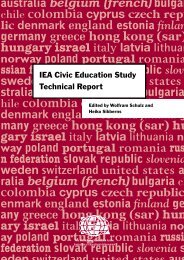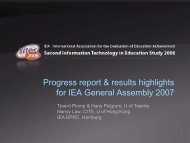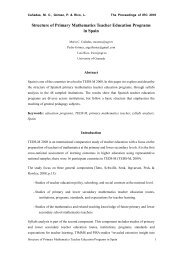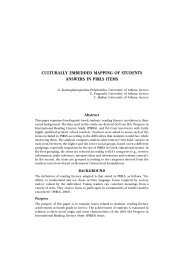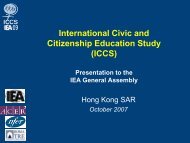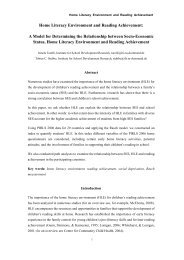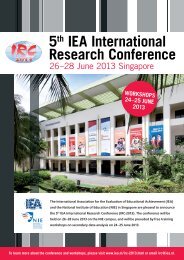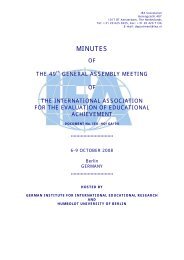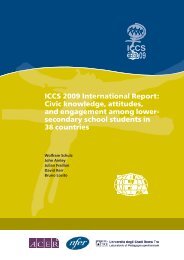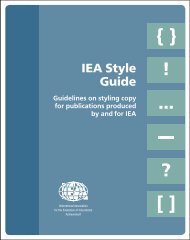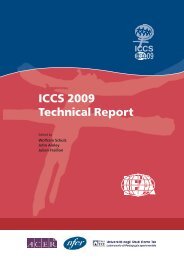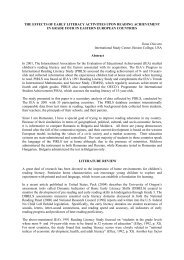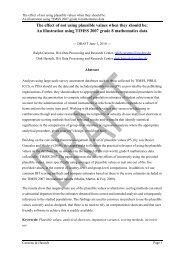International civic and citizenship education study - iccs - IEA
International civic and citizenship education study - iccs - IEA
International civic and citizenship education study - iccs - IEA
- TAGS
- civic
- citizenship
- iccs
- www.iea.nl
Create successful ePaper yourself
Turn your PDF publications into a flip-book with our unique Google optimized e-Paper software.
Potter, J. (2002). Active <strong>citizenship</strong> in schools. London: Kogan Page.<br />
Putnam, R. D. (1993). Making democracy work. Princeton, NJ: Princeton University Press.<br />
Putnam, R. D. (2000). Bowling alone: The collapse <strong>and</strong> revival of American community. New York: Simon<br />
<strong>and</strong> Schuster.<br />
Rahn, W. M. (2004). Globalization, the decline of <strong>civic</strong> commitments <strong>and</strong> the future of democracy. Paper<br />
presented at the conference on Democracy in the Twenty-First Century: Prospects <strong>and</strong> Problems,<br />
University of Illinois, October 24–26.<br />
Ranson, S., Farrell, C., Peim, N., & Smith, P. (2005). Does governance matter for school<br />
improvement? School Effectiveness <strong>and</strong> School Improvement, 16(3), 305–325.<br />
Reezigt, G. J., & Creemers, B. P. M. (2005). A comprehensive framework for effective school<br />
improvement. School Effectiveness <strong>and</strong> School Improvement, 16(4), 407–424.<br />
Reimers, F. (2007). Civic <strong>education</strong> when democracy is in flux: The impact of empirical research on<br />
policy <strong>and</strong> practice in Latin America. Citizenship <strong>and</strong> Teacher Education, 3(2), 5–21.<br />
Renshon, S. A. (1975). The role of personality development in political socialization. In D. C.<br />
Schwartz & S. Schwartz (Eds.), New Directions in Socialization (pp. 29–68). New York: Free Press.<br />
Richardson, W. (2003). Connecting political discussion to <strong>civic</strong> engagement: The role of <strong>civic</strong> knowledge,<br />
efficacy <strong>and</strong> context for adolescents. Unpublished doctoral dissertation, University of Maryl<strong>and</strong>, College<br />
Park, MD.<br />
Robinson, M. J. (1976). Public Affairs television <strong>and</strong> the growth of political malaise: The case of<br />
“the selling of the Pentagon.” American Political Science Review, 70, 409–432.<br />
Rokeach, M. (1973). The nature of human values. New York: The Free Press.<br />
Saha, L. J. (1997). Introduction: The centrality of the family in <strong>education</strong>al processes. In L. J. Saha<br />
(Ed.), <strong>International</strong> encyclopedia of the sociology of <strong>education</strong> (pp. 587–588). Oxford/New York/Tokyo:<br />
Elsevier.<br />
Scheerens, J. (1990). School effectiveness <strong>and</strong> the development of process indicators of school<br />
functioning. School Effectiveness <strong>and</strong> School Improvement, 1, 61–80.<br />
Scheerens, J., & Bosker, R. J. (1997). The foundations of <strong>education</strong>al effectiveness. Oxford: Pergamon.<br />
Scheufele, D. A., Nisbet, M. C., & Brossard, D. (2003). Pathways to political participation? Religion,<br />
communication contexts, <strong>and</strong> mass media. <strong>International</strong> Journal of Public Opinion Research, 15(3),<br />
300–324.<br />
Schulz, W. (2004). Scaling procedures for Likert-type items on students’ concepts, attitudes <strong>and</strong><br />
actions. In W. Schulz & H. Sibberns (Eds.), <strong>IEA</strong> Civic Education Study: Technical report (pp. 193–126).<br />
Amsterdam: <strong>International</strong> Association for the Evaluation of Educational Achievement (<strong>IEA</strong>).<br />
Schulz, W. (2005). Political efficacy <strong>and</strong> expected political participation among lower <strong>and</strong> upper secondary<br />
students. Paper presented at the ECPR General Conference, Budapest, September 8–10.<br />
Seltzer, J. (1994). Consequences of marital dissolution for children. Annual Review of Sociology, 20,<br />
235–266.<br />
Shulman, L. S. (1987). Knowledge <strong>and</strong> teaching: Foundations of the new reform. Harvard Educational<br />
Review, 57(1), 1–22.<br />
Stanat, P., & Christensen, G. (2006). Where immigrant students succeed: A comparative review of<br />
performance <strong>and</strong> engagement in PISA 2003. Paris: OECD Publications.<br />
Stoll, L. (1999). School culture: Black hole or fertile garden for school improvement? In J. Prosser<br />
(Ed.), School culture (British Educational Management series). London: Sage.<br />
Stolle, D., with Lewis, J. (2002). Social capital: An emerging concept. In B. Hobson, J. Lewis, &<br />
B. Siim (Eds.), Contested concepts in gender <strong>and</strong> European social politics (pp. 195–229). Cheltenham:<br />
Edward Elgar Press.<br />
Stolp, S. (1994). Leadership for school culture (ERIC Document Reproduction Service No. 91). East<br />
Lansing, MI: National Center for Research on Teacher Learning.<br />
54 ICCS ASSeSSment FrAmework



